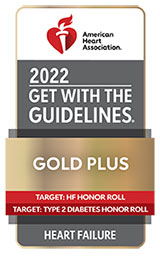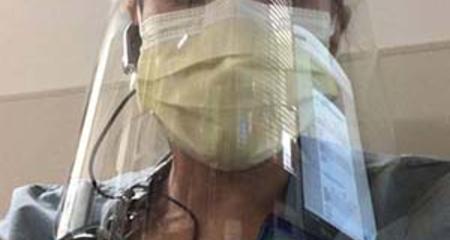Heart “failure” means the heart is not pumping effectively enough to meet the body’s needs for oxygen-rich blood. It can occur gradually or suddenly, and there are more than 200 possible causes. Some mild forms of heart failure may be reversible, and people may live for many years after diagnosis. Our treatment is aimed at helping people with heart failure live a full life.
Types of Heart Failure
There are two main types of heart failure: systolic and diastolic. If you have systolic heart failure, the heart does not squeeze strong enough to pump oxygen-rich blood throughout your body. If you have diastolic heart failure, your heart squeezes normally, but the main pumping chamber is stiff and cannot relax properly. This means less blood can get into the heart and blood pressure increases in the lungs.
What Is Congestive Heart Failure?
Congestive heart failure refers to the fluid congestion (edema) that occurs in the lungs and other parts of the body that makes it difficult for the heart to pump effectively. All types of heart failure focus on treating the underlying cause and symptoms.
Causes of Heart Failure
The causes of heart failure are other conditions that damage the heart, including:
- Coronary artery disease
- Diabetes
- Genetic factors
- Heart attack
- Heart valve disease
- High blood pressure
- Hypertrophic cardiomyopathy
- Inflammation of heart muscle
- Kidney disease
Lifestyle factors can also play a role in risk, including:
- Smoking
- Drinking alcohol
- Being overweight or obese
- Leading a high-stress life
Patients with heart failure may find that their condition worsens over time, despite appropriate treatment. That can be an indication of advanced heart failure.
Heart Failure Symptoms
Common symptoms of heart failure include:
- Swelling
- Fatigue
- Shortness of breath from simple activities
- Trouble breathing at rest
- Chest pain
- Coughing
These can be subtle and are easily mistaken for other illnesses so a heart failure diagnosis can be missed in the early stages. This unfortunately delays many people from seeing a cardiologist. Early diagnosis and treatment of heart failure gives you the best chance at prolonging your life.
Diagnosing Heart Failure
To test for and diagnose heart failure, your doctor will review your medical history, talk to you about your symptoms and perform a physical examination.
To confirm the diagnosis, the doctor may order some of the following tests:
- Blood tests — These tests check for signs of diseases that can affect the heart.
- Chest X-ray — X-rays provide imagery that allows the doctor to check the state of your lungs and heart.
- Electrocardiogram (ECG) — In this test, electrodes are attached to the chest and are used to provide imagery of the heart pumping function and valve abnormalities.
- Echocardiogram and Cardiac MRI — These tests provide a more sophisticated, detailed image of the heart.
- Stress test — A stress test is used to provide insight into your heart health, specifically by measuring how it responds to exertion.
Diagnosing the cause and extent of a patient’s heart failure is vital. It may require virtually every cardiac diagnostic tool and depends on each patient’s needs. See our complete list of advanced cardiac diagnostic tools.
Stages of Heart Failure
Heart failure is broken into early and advanced stages. Treatment in the early stages of heart failure includes prevention, lifestyle changes and medication. Advanced stages require more complex care that can include surgery and transplant. There are two classification systems that further describe your physical condition and severity of symptoms.
The typical heart failure classification is the four New York Heart Association (NYHA) functional classes. It looks at the effect your heart failure has on your every day life.
- Stage I: Patients in this stage have no limitation in physical activity and no symptoms.
- Stage II: Mild symptoms and slight limitation during physical activity.
- Stage III: Patients are comfortable at rest, but any physical activity causes symptoms.
- Stage IV: Severe symptoms exist even at rest, and any physical activity worsens them.
These stages are not fixed, and a your condition can fluctuate based on response to treatment. Effective management and treatment can improve a your NYHA functional class stage, moving you toward a less severe classification. Regular monitoring and adjustments to the treatment plan are essential to provide the best care for individuals with heart failure.
An additional heart failure classification from the American Heart Association looks at the condition of your heart and treatment options.
- Stage A: At risk. This stage includes individuals who are at risk of developing heart failure due to underlying conditions such as hypertension, diabetes, or coronary artery disease. They may not have structural heart problems or noticeable symptoms. The focus is on identifying and managing risk factors.
- Stage B: Pre-heart failure. In this stage, individuals have structural heart abnormalities (e.g., reduced ejection fraction) but do not yet exhibit symptoms of heart failure. This stage emphasizes the presence of structural issues even before symptoms appear.
- Stage C: Symptomatic heart failure. This stage involves patients with known heart failure who experience symptoms, such as shortness of breath, fatigue, and exercise intolerance, due to their heart condition. These individuals typically have underlying structural heart disease contributing to their symptoms. Stage C emphasizes the presence of symptoms along with structural heart issues.
- Stage D: Advanced heart failure. In Stage D, individuals have advanced heart failure with symptoms that persist despite optimal medical therapy and interventions. This stage is characterized by severe symptoms and limitations that significantly affect the quality of life. It often requires consideration of advanced therapies like heart transplantation or mechanical circulatory support devices. Palliative care and end-of-life planning may also become important in this stage.
Early Stage Heart Failure
Early stages heart failure, often referred to as Stage A or Stage B heart failure, is where the heart's function is impaired, but symptoms may not be present or are minimal. Early stage heart failure is considered serious because it signifies that the heart's function is compromised. While symptoms may not be present or are minimal at this stage, the condition can progress to more severe stages if not managed properly.
- In Stage A, there may not be any noticeable symptoms. This stage focuses on identifying and managing risk factors.
- In Stage B, there may be structural changes in the heart, such as a reduced ejection fraction. Symptoms may still be minimal or absent.
The treatments for early stage heart failure is comprehensive and is not solely centered around medications. Management typically includes:
- Lifestyle changes: Emphasize a heart-healthy diet, regular exercise and quitting smoking.
- Medications: When necessary, medications like ACE inhibitors, beta-blockers, or diuretics may be used to manage risk factors or symptoms.
- Monitoring: Regular check-ups with a healthcare provider to track heart function and adjust treatment as needed.
- Addressing underlying issues: Treating conditions like high blood pressure or diabetes, which contribute to heart failure risk.
Having a clear understanding of your medical condition and following your treatment plan is crucial. With appropriate management, it is possible to prevent or delay the progression of early stage heart failure to advanced stages. Lifestyle changes, medications, and monitoring can help stabilize the condition and improve your heart function.
In the continuum of heart failure care, Stage A, B, and early C heart failure is typically managed by general cardiologists, with a focus on preventive measures, lifestyle modifications, and a comprehensive range of treatments. These treatments encompass Guideline-Directed Medical Therapy (GDMT), addressing atrial arrhythmias, as well as the consideration and placement of implantable cardioverter-defibrillators (ICDs), pacemakers, and cardioMEMs when necessary.
Advanced Heart Failure
Without proper management, however, it can progress to more severe stages of heart failure.
This stage involves individuals who experience significant symptoms such as shortness of breath, fatigue and exercise limitations due to their heart condition. Underlying structural heart disease contributes to these symptoms.
We focus on halting the progression from Stage C to Stage D heart failure through comprehensive care. Our multidisciplinary team creates personalized treatment plans that include optimized medications, lifestyle changes, and diligent symptom monitoring. By addressing root causes and managing symptoms effectively, our goal is to maintain your heart health in the earlier stages of heart failure, ensuring both a higher quality of life and increased longevity.
Learn More About Advanced Heart Failure

In addition, the organization also recognizes Froedtert West Bend Hospital with Get With the Guidelines® — Heart Failure Silver Plus award.
Why Choose Froedtert & MCW Facilities
The Comprehensive Heart Failure and Transplant Program offers comprehensive diagnosis, treatment and follow-up care for advanced heart failure and heart transplant patients.
Our experienced team of specialists offers patients leading-edge treatment choices found only at an academic medical center. Froedtert Hospital's heart transplant program began in 1985 and is home to one of the fastest growing advanced heart failure and ventricular assist device programs in the state.
Caring for patients with advanced heart failure requires a host of expertise, resources, experience and compassion.
Our multidisciplinary team provides comprehensive treatment for the whole patient, including ventricular assist devices (VAD) and heart transplantation.
Comprehensive Heart Failure Treatment Options, Including VADs

A full spectrum of treatment options is offered including total artificial hearts and ventricular assist devices (VADs). We were awarded the Gold Seal of Approval by The Joint Commission for their Adult VAD Destination Therapy Program. We have one of the fastest growing advanced heart failure and VAD programs in the nation.
A VAD can serve as a “bridge” to those awaiting transplant, allowing them to return home while they wait for a donor heart. A VAD may also be the “destination” therapy, with no plans for a heart transplant. Learn more about VADs.
Extensive Heart Transplant Experience
Heart transplant patients can feel confident knowing that our heart care experts have been performing heart transplants since 1985. The team has extensive experience in transplant procedures, which have offered patient survival rates of 20 years and beyond.
This experience combines with the latest technology and techniques throughout the patient care experience to make possible the best patient outcomes.
Our program was the first in Wisconsin to use CARDIOHELP, an extracorporeal membrane oxygenation, or ECMO, machine, which is a portable machine for heart and lung support in very sick patients. The device maintains blood and oxygen circulation outside of the body for several hours or even days. Learn more about Heart Transplant
Excellent Follow-up Care Makes a Critical Difference
Close follow-up care is vital for anyone with heart failure. Sudden or gradual changes in a patient’s symptoms or their overall health can signal the need for adjustments to their therapy. We pay close attention to where our patients are in their disease and their treatment. Heart failure is a chronic disease requiring lifelong care, and our goal is to help our patients feel as good as they can for as long as they can.
A Progression of Therapy
The cause of heart failure helps determine the best treatment approach. For example, if the heart failure is caused by a valve disorder, then surgery is usually performed. If it is caused by a disease, such as anemia, then the disease is treated. Several other therapies may be tried before a VAD or heart transplant is considered, including: medical management; surgical procedures to correct underlying problems; and use of a biventricular pacemaker (cardiac resynchronization therapy) or implanted defibrillator device.
Expert Care for Even the Sickest Patients
Advanced heart failure patients often have other serious medical conditions that require expert care. As the only academic medical center in eastern Wisconsin, we have a vast array of experts and specialists who collaborate to deliver the best care possible for even the sickest patients. In fact, we often see patients who have been refused at other centers because the number of medical issues they face and the severity of their disease. Our specialists also see patients at our outreach clinics in Fond du Lac, Wis., and Sheboygan, Wis.
Research
Because we are a leading academic medical center, research is central to our work. Medical College of Wisconsin physicians are continually participating in and conducting significant research studies to further understand the causes of heart failure and identify innovative treatments. Our patients can participate in local and national clinical trials, which can give them access to the latest treatment options. By looking for new ways to treat heart failure, we may also be reducing the need for heart transplants.
Referrals and Second Opinion Program
We are happy to work your doctor or with you to explore more options regarding your heart condition.
Locations
The Comprehensive Heart Failure and Transplant Program is located in the Center for Advanced Care on the Froedtert Hospital campus.
Our specialists also see patients at our outreach clinics in Fond du Lac, Wis., and Sheboygan, Wis.
International Patients
We are here to help international patients arrange for their care at Froedtert Hospital in Milwaukee, Wisconsin.
Virtual Visits Are Available
Safe and convenient virtual visits by video let you get the care you need via a mobile device, tablet or computer wherever you are. We'll assess your condition and develop a treatment plan right away. To schedule a virtual visit, call 414-777-7700.
Recognized as High Performing by U.S. News & World Report
Froedtert Hospital, Froedtert Menomonee Falls Hospital and Froedtert West Bend Hospital are recognized by U.S. News & World Report as high performing in heart failure care.More to Explore





